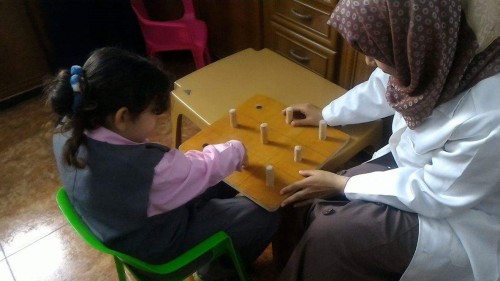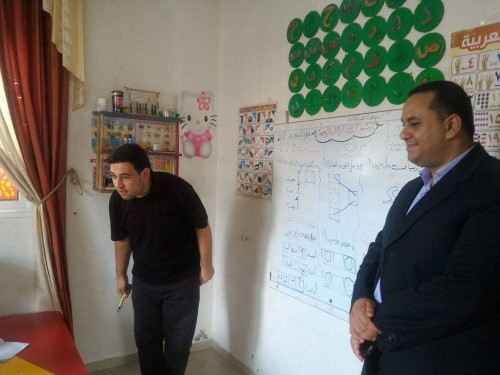#international development
Supporting Children with Special Needs in Gaza City
We are pleased to offer our support to the Sanabel School in Gaza City to develop services for children with mental disabilities. Our project supports psychological, rehabilitative and integrated educational activities for children in Gaza City, helping this generation to become future leaders.
Students who suffer from the loss of communication with teachers, with learning difficulties and slow learning, little and medium intellectual disabilities, language delay and autistic spectrum disorders, benefit from the educational resources room.
Post link
The Vision Project, our joint initiative with UNRWA has been covered with a piece on Middle East Monitor.
The project has provided over two hundred blind and visually impaired children in Gaza with cutting-edge digital technology to help them access information sources, learning opportunities and creative initiatives. It also equipped visually impaired children in Gaza with “Voice Dream Reader” technology to supplement their education. As part of The Vision Project we also provided digital and equipment training to 33 UNRWA teachers.



Read the article and see more photos here.
PRESS RELEASE: The Vision Project is successfully completed in Gaza
We are delighted to announce the completion of The Vision Project, a joint initiative with @united-nations Relief and Works Agency @unrwausa which has provided over two hundred blind and visually impaired children in Gaza with cutting-edge digital technology to help them access information sources, learning opportunities and creative initiatives.
Read more about The Vision Project here:
Post link
“Let’s pretend, for a moment, that you are a 22-year-old college student in Kampala, Uganda. You’re sitting in class and discreetly scrolling through Facebook on your phone. You see that there has been another mass shooting in America, this time in a place called San Bernardino. You’ve never heard of it. You’ve never been to America. But you’ve certainly heard a lot about gun violence in the U.S. It seems like a new mass shooting happens every week. You wonder if you could go there and get stricter gun legislation passed. You’d be a hero to the American people, a problem-solver, a lifesaver. How hard could it be? Maybe there’s a fellowship for high-minded people like you to go to America after college and train as social entrepreneurs. You could start the nonprofit organization that ends mass shootings, maybe even win a humanitarian award by the time you are 30. Sound hopelessly naïve? Maybe even a little deluded? It is. And yet, it’s not much different from how too many Americans think about social change in the “Global South.” If you asked a 22-year-old American about gun control in this country, she would probably tell you that it’s a lot more complicated than taking some workshops on social entrepreneurship and starting a non-profit. She might tell her counterpart from Kampala about the intractable nature of our legislative branch, the long history of gun culture in this country and its passionate defenders, the complexity of mental illness and its treatment. She would perhaps mention the added complication of agitating for change as an outsider. But if you ask that same 22-year-old American about some of the most pressing problems in a place like Uganda — rural hunger or girl’s secondary education or homophobia — she might see them as solvable. Maybe even easily solvable. I’ve begun to think about this trend as the reductive seduction of other people’s problems. It’s not malicious. In many ways, it’s psychologically defensible; we don’t know what we don’t know. If you’re young, privileged, and interested in creating a life of meaning, of course you’d be attracted to solving problems that seem urgent and readily solvable. Of course you’d want to apply for prestigious fellowships that mark you as an ambitious altruist among your peers. Of course you’d want to fly on planes to exotic locations with, importantly, exotic problems. There is a whole “industry” set up to nurture these desires and delusions — most notably, the 1.5 million nonprofit organizations registered in the U.S., many of them focused on helping people abroad. In other words, the young American ego doesn’t appear in a vacuum. Its hubris is encouraged through job and internship opportunities, conferences galore, and cultural propaganda — encompassed so fully in the patronizing, dangerously simple phrase “save the world.””—
“The Reductive Seduction of Other People’s Problems” by Courtney Martin
(via
)
Capitalism can’t save the world, but it can simulate the experience and sell it to you.
(vianewwavenova)






